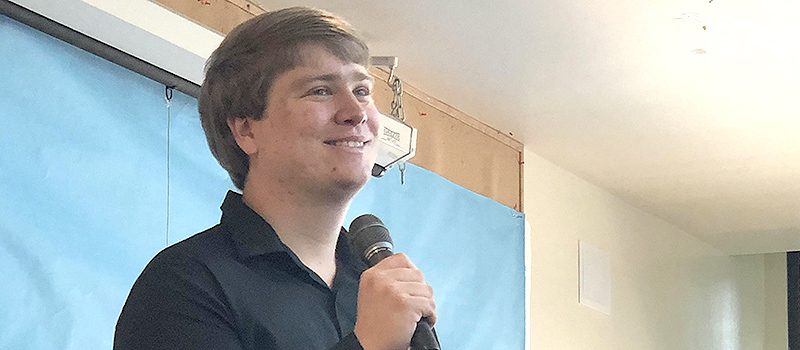
Gabriel Kelvin speaking at Victor Valley College (Photo courtesy of Gabriel Kelvin)
California Forward is committed to advancing policy intersections that create a more inclusive and sustainable California where all people can prosper. To move this forward, we must address the racial and geographic inequities that have been exacerbated by a public health and economic crisis, and we must answer the call to dismantle structural racism. The Voices of Shared Prosperity series amplifies the stories of Californians who are committing their time and talent to solutions that embrace equity, the environment, and the economy.
Gabriel Kelvin epitomizes one of Muhammed Ali’s most famous quotes “Don’t count the days, make the days count.”
He recently earned an associate’s degree from Victor Valley College where he served as the student body president in addition to a host of other roles. Until very recently, he also worked as a writer and night-editor for the Victorville Daily Press. His position was part of the many layoffs that the paper made in response to COVID-19, but Gabriel categorized this as a brief reprieve from his normal schedule.
His normal 80-hour work weeks were far beyond the imagination of most college students and many professionals for that matter, but his commitment to contributing to the change he wants to see anchors his efforts. Kelvin says “it is of critical importance to make a difference – that’s how I grew up. I’ve always been that way.”
He studied political science at VVC, and he is a strong advocate for responsible government because he has first-hand experience with the impacts of poor business practices and insufficient government oversight. Gabriel vividly recalls the impact of the 2008 recession on his family. They suffered a tremendous loss after his father, who prior to the recession was a financially successful mortgage banker, died of a heart attack. Although he was a child, from that point forward Kelvin was a part of every financial decision in his home. It was these experiences that motivated him to pursue a career in public administration.
While he has been accepted into University of California Berkeley and University of California Irvine, he credits VVC with positioning him for success. Before enrolling at VVC, his home responsibilities challenged his educational journey. Gabriel said “Victor Valley College gave me my life back. The connections there got me my [current] job. It gave me the ability to plug into public administration, it gave me the ability to apply to amazing schools.”
Serving more than 2.1 million students across 115 colleges, the primary functions of the community college system are to serve as transfer institutions and provide employment preparation and training for the existing workforce. In the 2017-18 school year, the California community college system helped more than 531,000 students achieve career technical certificates.
| California Dream Index Fact: In 2017-18, California community colleges helped 531,000 students received Career Technical Certificate. |
|---|
| *Launching at the 2020 California Economic Summit, the California Dream Index is a tool that measures and tracks economic mobility. |
As the country is faced with gaping disparities in response to COVID-19, Kelvin says “[the pandemic] has presented anyone with an in-person learning style or limited access to internet or computers a tremendous challenge that may very well delay or alter their education journey. Our institutions need to make every effort to serve students that this change will negatively impact, and it is extremely important that Career Technical Education classes not be swept away in this time. These are people’s futures.”
Kelvin believes there are several key things the state can do to support Community Colleges and the communities they serve, including:
-
- Making Career Technical Education (CTE) classes a funding priority. Various reports indicate that CTE classes are more resource intensive for instructors and they have a lower profit margin for the respective schools than many of the less specialized courses, but Kelvin stresses the critical value of these programs. Jokingly but in seriousness he says “we’re all going to have liberal arts degrees and none of us are going to have a mechanic.”
-
- Dissolving the CTE stigma. It’s vital to raise awareness about the availability of CTE programs as viable resources and economic advancement tools within communities. Kelvin added that these programs “are the future of the state and dissolving the stigma around them is tremendously important.”
-
- Providing more support for Community College Transfer and Career Centers. Kelvin argues that support centers are among the most critical operations on the campus. A good example of a program is the California Guided Pathways initiative, which strategically guides students through the community college system from when they first begin to when they attain post-secondary credentials and careers.
- Create resources in alignment with the needs of students. Kelvin cited AB 705, which defunded remediation classes and requires students to complete coursework within one year as an example of a policy that can be restructured to align more directly with the needs of many community college students. Kelvin argues that students who do well on the first attempt are often already in good shape and that the state needs to do a better job of creating a landing zone for disadvantaged groups that need more support.
 “I have the firm, firm conviction that California Community Colleges are the means to social transformation. If we are ever going to solve homelessness, if we’re ever going to solve racial inequality, if we’re ever going to solve economic inequality, it’s going to be through the Community Colleges,” he added.
“I have the firm, firm conviction that California Community Colleges are the means to social transformation. If we are ever going to solve homelessness, if we’re ever going to solve racial inequality, if we’re ever going to solve economic inequality, it’s going to be through the Community Colleges,” he added.
Gabriel is well on his way to an impactful career in public administration and he will continue to use his platform to create opportunities for others and make the most of every moment on his journey.
You can reach out to Gabriel directly by email at 279kelvin@gmail.com.
The Voices of Shared Prosperity stories will be shared in advance of the 2020 California Economic Summit, taking place on December 3-4.

